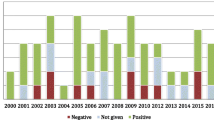Abstract
The proliferation of patents on human genes has raised important ethical questions centered on the conflict of patient rights and intellectual property rights. With the Supreme Court’s June 2013 decision that altered the patent eligibility of genetic material, it is important to reexamine the ethical implications of gene patents as a concept. Such patents suggest an ownership of genetic material that may hinder access to healthcare and inhibit medical progress. The application of the current patent system to genetic material thus violates patients’ rights without fulfilling the system’s goal of promoting innovation, suggesting a need for a revised incentives infrastructure.
Similar content being viewed by others
References
Association for Molecular Pathology et al v. Myriad Genetics, Inc., et al., No. 12-398 (U.S. June 13, 2013). Retrieved from http://www.supremecourt.gov/.
Association for Molecular Pathology et al v. United States Patent and Trademark Office et al 702 F.Supp.2d 181 (S.D. New York 2010).
Bermejo-Perez, M. L., Marquez-Calderon, S., & Llanos-Mendez, A. (2007). Effectiveness of preventive interventions in BRCA1/2 gene mutation carriers: A systematic review. International Journal of Cancer, 121(2), 225–231. doi:10.1002/ijc.22817.
Chandrasekharan, S., Heaney, C., James, T., Conover, C., & Cook-Deegan, R. (2010). Impact of gene patents and licensing practices on access to genetic testing for cystic fibrosis. Genetics in Medicine, 12(4), S194–S211. doi:10.1097/GIM.0b013e3181d7cf7d.
Cho, M. (2010). Patently unpatentable: Implications of the Myriad court decision on genetic diagnostics. Trends in Biotechnology, 28(11), 548–551. doi:10.1016/j.tibtech.2010.08.005.
Cook-Deegan, R. (2008). Gene patents. In M. Crowley (Ed.), From Birth to Death and Bench to Clinic: The Hastings Center Bioethics Briefing Book for Journalists, Policymakers, and Campaigns (pp. 69–72). Garrison, NY: The Hastings Center. Retrieved from http://www.thehastingscenter.org/.
Cook-Deegan, R., DeRienzo, C., Carbone, J., Chandrasekharan, S., Heaney, C., & Conover, C. (2010). Impact of gene patents and licensing practices on access to genetic testing for inherited susceptibility to cancer: Comparing breast and ovarian cancers with colon cancers. Genetics in Medicine, 12(4), S15–S38. doi:10.1097/GIM.0b013e3181d5a67b.
Gold, E. R., & Carbone, J. (2010). Myriad genetics: In the eye of the policy storm. Genetics in Medicine, 12(4), S39–S70. doi:10.1097/GIM.0b013e3181d72661.
Lever, A. (2001). Ethics and the patenting of human genes. The Journal of Philosophy, Science & Law, 1. Retrieved from http://jpsl.org/.
Macer, D. R. J. (2002). Patent or perish? An ethical approach to patenting human genes and proteins. The Pharmacogenomics Journal, 2, 361–366. doi:10.1038/sj.tpj.6500140.
Merz, J. F., & Cho, M. K. (2005). What are gene patents and why are people worried about them? Community Genetics, 8(4), 203–208. doi:10.1159/000087956.
Price, W. N. (2012). Unblocked future: Why gene patents won’t hinder whole genome sequencing and personalized medicine. Cardozo Law Review, 33(4), 1601–1631. Retrieved from http://www.cardozolawreview.com/.
Ratcliffe, S. (2011). The ethics of genetic patenting and the subsequent implications on the future of health care. Touro Law Review, 27(2), 435–460. Retrieved from http://digitalcommons.tourolaw.edu/lawreview/.
Rios, J., & Puhalla, S. (2011). PARP inhibitors in breast cancer: BRCA and beyond. Oncology, 25(11), 1013. Retrieved from http://www.cancernetwork.com/.
Schroeder, D., & Singer, P. (2011). Access to life-saving medicines and intellectual property rights: an ethical assessment. Cambridge Quarterly of Healthcare Ethics, 20(2), 279–289. doi:10.1017/S0963180110000939.
Soini, S., Ayme, S., & Matthijs, G. (2008). Patenting and licensing in genetic testing: Ethical, legal and social issues. European Journal of Human Genetics, 16, S10–S50. doi:10.1038/ejhg.2008.37.
UNESCO. (1997). Universal Declaration on the Human Genome and Human Rights (Session 29/Resolution 16). Paris, France: UNESCO. Retrieved from http://www.unesco.org/.
Acknowledgments
Yun-Han Huang was supported by a Medical Scientist Training Program grant from the National Institute of General Medical Sciences of the National Institutes of Health under award number: T32GM07739 to the Weill Cornell/Rockefeller/Sloan-Kettering Tri-Institutional MD-PhD Program. The content of this essay is solely the responsibility of the author and does not necessarily represent the official views of the National Institutes of Health.
Author information
Authors and Affiliations
Corresponding author
Rights and permissions
About this article
Cite this article
Huang, YH. Gene Patents: A Broken Incentives System. J Relig Health 52, 1079–1084 (2013). https://doi.org/10.1007/s10943-013-9758-2
Published:
Issue Date:
DOI: https://doi.org/10.1007/s10943-013-9758-2




